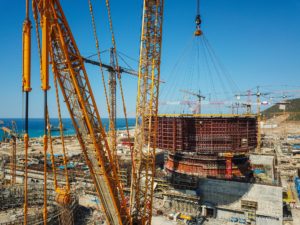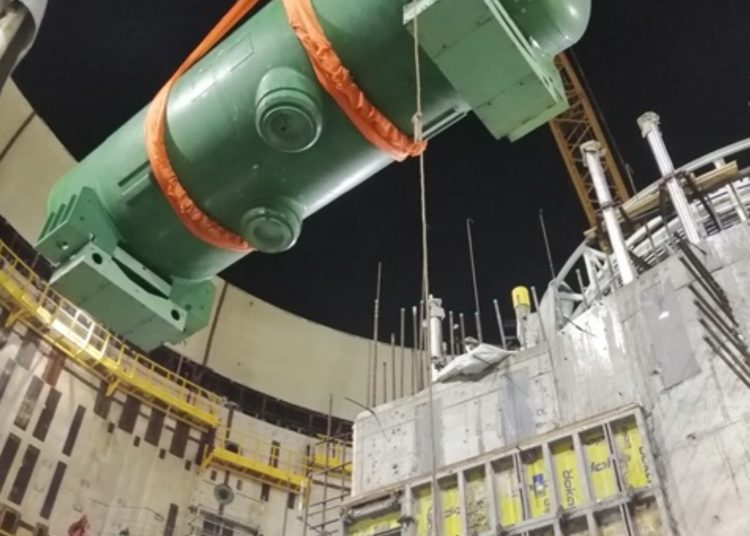Abdullah Bozkurt/Stockhoolm
Turkey’s state-owned company responsible for operating and managing nuclear power plants has acknowledged its exclusion from involvement in the Russian-built nuclear facility in the province of Mersin — a $24 billion project dominated entirely by Russian interests, from construction to operation.
The acknowledgment was made by the head of the Turkey Nuclear Energy Corporation (Türkiye Nükleer Enerji A.Ş., TÜNAŞ) during a May 13 closed session of the parliamentary committee that oversees state-owned enterprises and audits their expenses on behalf of taxpayers.
TÜNAŞ was established in 2022 to spearhead Turkey’s nuclear energy initiatives. Its primary mission is to plan, develop and manage new nuclear power plant (NPP) projects, thereby enhancing the nation’s energy security and reducing dependence on imported fossil fuels.
“TÜNAŞ, our company, will establish and operate the nuclear power plants to be built in both Sinop — a northern province of Turkey — and Thrace, the European part of the country’s northeast, in partnership with foreign investors,” said Necati Yamaç, the company’s general manager.
“Since our state does not yet have a partnership in the Akkuyu project, our current mandate is to act as the founding and operating entity for the Second and Third Nuclear Power Plant Projects in Sinop.”
In 2010 Turkey and Russia signed a bilateral agreement that paved the way for the construction and operation of Turkey’s first nuclear power plant in Akkuyu, located in the Gülnar district of Mersin province. The project is being carried out by Russia’s Rosatom State Nuclear Energy Corporation.

Originally estimated to cost $20 billion, the plant will consist of four reactors with a total capacity of 4,800 megawatts (MW), expected to supply around 10 percent of Turkey’s electricity needs. As of today, the projected cost has risen to approximately $24 billion.
The first unit of the plant is expected to become operational by the end of 2025, with the remaining three units scheduled to come online sequentially at one-year intervals.
Under the 2010 agreement, Turkey retains the right to acquire up to 49 percent of the company’s shares. However, it has inexplicably not exercised this option over the past 15 years. Akkuyu Nuclear Anonim Şirketi (Akkuyu), the project company established in December 2010, remains entirely Russian-owned. Its founding shareholders include Atomstroyexport, Inter RAO UES, Konzern Rosenergoatom, Atomtechenergo and Atomenergoremont — all of which are affiliated with the Russian state.
The remarks made by TÜNAŞ’s general manager during the committee hearing — the transcript of which was obtained by Nordic Monitor — suggest that the Turkish government has effectively thrown in the towel on becoming a partner in the Akkuyu plant, instead shifting its focus to the second and third nuclear power plants it plans to build in other parts of the country.

During the committee meeting, opposition lawmakers voiced serious concerns about Turkey’s nuclear energy projects, particularly the Akkuyu Nuclear Power Plant. While acknowledging that nuclear energy is often promoted as a solution to the country’s energy needs, they emphasized the significant risks it poses including environmental challenges and a lack of transparency. Lawmakers criticized Turkey’s limited experience in managing radioactive waste, the inadequate infrastructure, especially in terms of earthquake preparedness, and the absence of a clear strategy for nuclear waste disposal.
The opposition warned that any leakage, sabotage or accident at the plant could lead to severe contamination of soil, water and air — particularly concerning given Turkey’s seismic activity and Akkuyu’s proximity to active fault lines. They also pointed to the potential ecological damage from excessive water usage for cooling, which could harm marine life and local fisheries, as well as the environmental and health risks associated with uranium mining.
Furthermore, the opposition expressed concern over Turkey’s growing dependence on Russia and the lack of transparency in both the financial and operational aspects of the project — questioning who is profiting from the deals and why Turkish companies have had limited involvement in the construction phase.
Other nuclear power plant projects have also faced criticism. The second planned plant in Sinop, officially announced in 2013, has made some progress, including the completion of the Environmental Impact Assessment (EIA), site licensing and zoning plans. The proposed location is the İnceburun region of Abalı Village, situated in Turkey’s Black Sea coastal province of Sinop.

Turkey has not yet decided which country or company will be awarded the contract for constructing the plant, but the licensing process indicated a preference for a design similar to the Flamanville III nuclear power plant in France.
The Sinop plant has faced strong opposition from local and national organizations and has been the subject of multiple legal challenges due to a lack of transparency regarding the plant’s contractor and operator. Critics have raised concerns about the planned destruction of 1.2 million trees before construction, the potential harm to marine life and the local fishing economy caused by seawater usage, and the risk of a nuclear disaster reminiscent of Chernobyl.
The government is determined to move forward without public consultation, appears unconcerned by legal challenges due to its full control over the judiciary and has withheld information about potential foreign partners.
According to TÜNAŞ’s manager, work on the third nuclear power plant has so far involved evaluating the site’s existing conditions, conducting analyses and preparatory studies and developing project management plans in anticipation of the project’s official commencement.
Although the location is not yet finalized, both Greece and Bulgaria have expressed concerns about the power plant being built near their borders. Greece is worried about the plant’s proximity to its territory and the seismic risks, given its cautious stance on nuclear energy due to frequent earthquakes. Bulgaria, citing environmental safety and regional security, is uneasy about the plant’s closeness to its border.
Turkey aims to achieve a nuclear power capacity of 20 GW by 2050 and to transfer and develop its own nuclear technology, know-how and skilled workforce to build, operate and manage such plants. However, the process of awarding contracts for nuclear and other power plants in Turkey has often been plagued by a lack of transparency and marred by corruption allegations, reportedly benefiting President Receo Tayyip Erdogan, his family members and his business and political associates.












